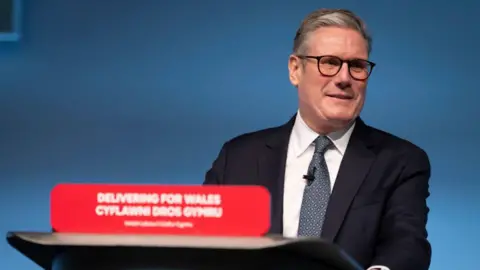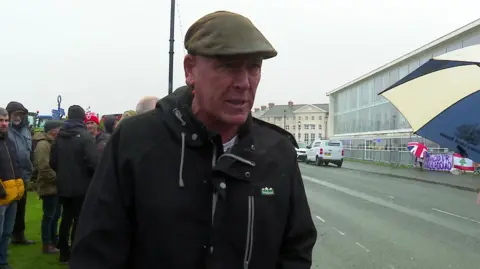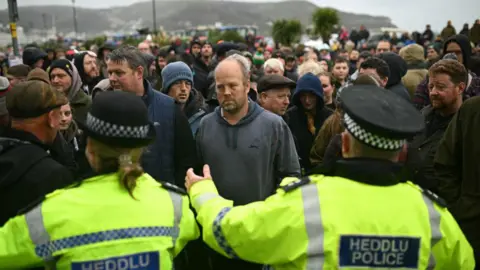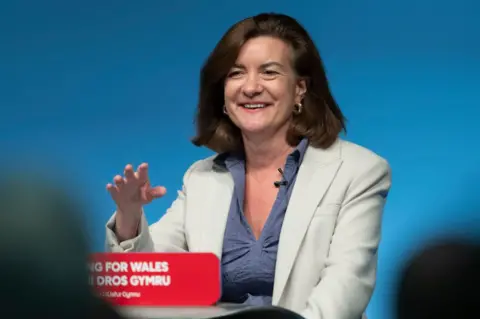Inheritance tax: Farmers protest as Keir Starmer defends Budget

Hundreds of protesters opposing changes to inheritance tax rules for farms gathered outside the Welsh Labour conference as Prime Minister Sir Keir Starmer defended his government’s recent Budget measures.
Farming unions have said the planned changes will have “disastrous” consequences.
Starmer told the conference in Llandudno, Conwy, he would defend the Budget “all day long” for taking “tough decisions that were necessary to stabilise our economy”.
Dozens of tractors and farm vehicles were parked on the prom outside the conference at Venue Cymru.
 Getty Images
Getty ImagesLater, in the afternoon, Welsh Labour leader and First Minister Eluned Morgan announced that the Welsh NHS will receive an extra £22m to tackle waiting lists.
Signs reading “Enough is enough” and “No Farmers No Food” were held up as conference attendees entered the building for the morning session.
Conwy county farmer and broadcaster Gareth Wyn Jones said he and others were taking part in the protest to “air their frustrations”.
He described the changes to inheritance tax rules as a “massive bombshell” that would affect “thousands” of farming families.
“For us in Wales, we’ve been under a Labour government for 25 years and enough is enough,” he said.
“The morale, the mental health… everything is at an all-time low.
“People need to understand we want to feed them and, at this moment in time, it’s going to be a massive inflation in food.
“And the poorer people in society are the ones that are going to suffer, and that’s what Labour should be protecting.”

Deputy Welsh First Minister and Rural Affairs Secretary Huw Irranca-Davies met a delegation of the farmers and spoke to the farming unions.
Starmer did not meet the protesters, or refer to them in his speech, stressing that he would “defend our decisions in the Budget all-day long”.
He told the conference: “I will defend facing up to the harsh light of fiscal reality, defend tough decisions that were necessary to stabilise our economy, and I will defend protecting the payslips of working people, fixing the foundations of our economy, and investing in the future of Britain and the future of Wales, finally turning the page on austerity – once and for all.”
The prime minister said the time was “long overdue for Westminster politicians to level with people, honestly, about the trade-offs that Britain faces”.
Politicians had to “stop insulting your intelligence with the chicanery of easy answers, when that is exactly how we got into this mess in the first place”, he said.
“It’s hard, of course it is hard,” he added.
 Getty Images
Getty ImagesDairy farmer Abi Reader, deputy president of NFU Cymru, urged the Treasury to rethink its inheritance tax policy changes, saying thousands more farmers would be affected than it has suggested.
“We should be very live to the fact that it is not a guarantee that we are going to be producing the same amount of food year on year with the change in climate and the geopolitical issues that we face today,” she told BBC News.
Describing the current political circumstances as a “once in a generation chance for a Labour government in Westminster to work in partnership with a Labour government in Wales”, Starmer confirmed plans for a £160m investment zone in Flintshire and Wrexham would go ahead next year.
In his first speech to a Welsh Labour conference since becoming prime minister, he said the scheme would “create more jobs and drive economic growth across north Wales”.
The plans were put forward by the previous Conservative government
The conference comes at the end of a turbulent year, during which Welsh Labour has had three leaders.
Having succeeded Mark Drakeford in March – becoming Wales’ first black first minister – Vaughan Gething stepped down in July following controversy over donations to his campaign.
Earlier this week, Eluned Morgan marked 100 days as first minister by making it clear her priority was to drive down hospital waiting lists, which are at record levels with more than 600,000 people awaiting treatment.
In the afternoon session she told the conference that the Welsh NHS will receive an extra £22m to tackle waiting lists, in addition to an announcement of £28m last month to cut waiting times.
“I can say with certainty that more resources are needed,” she said.
“This additional investment will go towards ensuring more operations are done through expanding treatment capacity and ensuring patients don’t have to wait unacceptably long periods for the procedures that can dramatically improve their quality of life.”
In an upbeat speech, Morgan rehearsed many of the messages that she and her party will deploy in the 18 months between now and the 2026 Senedd election.
Welsh Labour, she said, had long been the “beating heart of Welsh politics”.
“Our story, the story we write every day, is one of hope, resilience and a deep belief that together we can build a better Wales for all,” she said.
“From my early days surrounded by the strength and solidarity of my community”, growing up in Ely, Cardiff, “to my service in the European Parliament, the UK Parliament, and now the Senedd as your first minister, I have remained steadfast in my commitment to the values that define us as Welsh Labour”.
“Today I stand before you not just as the leader, but as a fellow member of our movement ready to confront the challenges ahead with experience and determination.”
A £13m grant fund to help redundant Port Talbot steel workers and their families was announced by Welsh Secretary Jo Stevens, aimed at supporting people to set up their own businesses and expand and diversify local firms and those in the Tata supply chain.
The money is part of £80m from the UK government to help 2,800 Tata workers losing their jobs and help the local economy cope with the impact.
Tata has closed its two coal-fired blast furnaces and is to replace them with an electric furnace that will need fewer workers.
Stevens said: “We said we would back workers and businesses affected by the transition at Port Talbot and we are doing so with more than £26m announced since July.”
 Getty Images
Getty ImagesMorgan and opposition parties have been pressing the UK government to give Wales a slice of the cash spent on the HS2 high speed rail project in England.
They believe UK government’s funding rules, known as the Barnett Formula, should mean a dividend for the Welsh government, something ruled out by the previous Conservative government at Westminster.
On Friday, Starmer also ruled that out, telling BBC Wales: “I want to deliver for Wales, but actually heavy rail, if you like, the heavy infrastructure, that’s not devolved, and therefore the Barnett rules don’t apply.
“We are already sitting around the table with the Welsh government on rail infrastructure that is important across Wales, because we need to get on with that.
“And so we’ll do that, and that’s really the game changer.”
Additional reporting by Nicholas Bourne, Mark Palmer and Carwyn Jones





